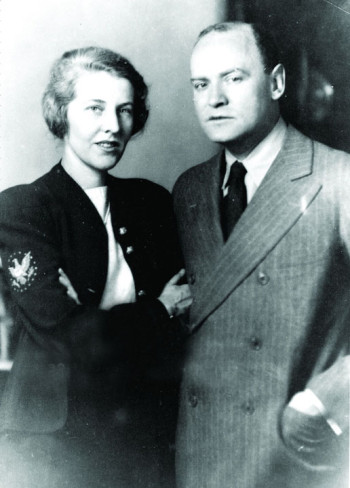White, Kathrine Klinkenberg
Kathrine Klinkenberg White planted the seeds of her journalism career in Ottawa (KS.) High School’s newspaper and yearbook; she brought them into full bloom when she married into a small town, family-owned community newspaper with a nationally famous founder.
Kathrine Klingenberg had been hired as an office assistant by Time magazine after attending the University of Kansas and the University of Wisconsin. She soon was promoted to do research for Time’s editorial department and – while filling in as interim sports editor – she seized the opportunity to do a flyover of New York City Amelia Earhart piloting the plane. Kathrine later became an assistant curator at the Library of Congress.
She married William Lindsay White in New York City in 1931. The couple initially divided their time between Emporia, which he represented as a state legislator, and Washington, D.C., where he wrote for The Washington Post. Kathrine White’s talents as an editor complemented White’s talents as a writer; she edited most of his first drafts. She also edited several books by her husband as well as William Allen White’s Pulitzer Prize-winning autobiography, which W.L. completed when his father died before the manuscript was finished.
W.L.’s professional involvements and frequent international travels prompted the Whites to keep an apartment in New York City in addition to Red Rocks, the family home in Emporia, where he was editor and publisher of The Gazette. Kathrine did not maintain a daily presence in the office, but her advice and her editorial judgment played roles in Gazette operations.
The Whites returned to Emporia to stay when W.L. was diagnosed with cancer. After his death on July 26, 1973, Kathrine took over as The Gazette’s editor. She easily could have passed the job directly to her adult daughter, Barbara White Walker, but Kathrine wanted to do it. At 72 her passion for community news burned bright.
Kathrine’s editorial and business skills were well developed, as was her nose for news. Every weekday afternoon, after the paper was out, she would come into the newsroom, or call newsroom personnel into her office, to be updated on the latest news and rumors of news and to discuss content of the following day’s paper.
When breaking news happened in Emporia – a destructive tornado in 1974, for example – Mrs. White oversaw the effort from the Gazette newsroom. Because of breaking news’ unpredictability, it was inevitable that an employee would need to bring a child to work. Kathrine White was unfazed. She sat the 10-year-old child down at a desk, handed her paper and a pencil, and told her to write a story about what she observed. The child wrote about a tornado-flattened playhouse that had been built (and wired for electricity) by a precocious, now emotionally devastated, 13-year-old boy. Kathrine published it as part of the extra edition, to give readers a child’s view of the tornado’s damage.
In the 1980s a local homicide investigation bloomed into a full-scale national story; a pastor and his church secretary were eventually charged with murdering their spouses to get together. During the heyday of the case, Mrs. White invited her friend, the New Yorker writer Calvin Trillin to Emporia and he wrote a long piece on the case.
Kathrine immersed herself in community happenings, did not hesitate to dedicate reporters’ time to cover an important story as it percolated, and continued to lead the newsroom after her own battle with cancer began. The afternoon updates continued, either by phone or by a visit to her home office at Red Rocks. No one doubted whether Kathrine was the decision-maker.
In the print news world, however, some large newspaper conglomerates already had been envisioning the end of family-owned newspapers. Since W.L.’s death, Kathrine had received, and continued to receive, written offers to buy The Gazette. She prepared a polite response to all these: “The people here are like family. And you don’t sell family.”
Following her death on Aug. 17, 1988, at the age of 85, daughter Barbara became editor of The Gazette, while son-in-law David Walker remained publisher, as he had been during W.L.’s illness. The Walkers’ youngest son, Christopher White Walker, now is publisher. His wife, Ashley Knecht Walker, is editor.
Almost 35 years after Kathrine’s death, and more than 120 years since patriarch W.A. White founded it, The Gazette and its family are smaller now; but it remains a family-owned newspaper covering news about its community.

